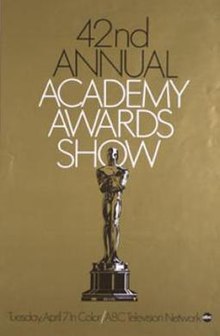42nd Academy Awards
| 42nd Academy Awards | |
|---|---|
 |
|
| Date | April 7, 1970 |
| Site | Dorothy Chandler Pavilion, Los Angeles |
| Hosted by | Quincy Jones |
| Produced by | M.J. Frankovich |
| Directed by | Jack Haley, Jr. |
| Highlights | |
| Best Picture | Midnight Cowboy |
| Most awards | Butch Cassidy and the Sundance Kid (4) |
| Most nominations | Anne of the Thousand Days (10) |
| TV in the United States | |
| Network | ABC |
| Duration | 2 hours, 25 minutes |
| Ratings | 43.4% (Nielsen ratings) |
The 42nd Academy Awards were presented April 7, 1970 at the Dorothy Chandler Pavilion, Los Angeles. There was no host. This was the first Academy Awards ceremony to be broadcast via satellite to an international audience, but only outside North America. Mexico and Brazil were the sole countries to broadcast the event live.
This is currently the highest rated of the televised Academy Awards ceremonies, according to Nielsen ratings.
Midnight Cowboy became the first – and so far, the only – X-rated film to win the Academy Award for Best Picture. The previous year had seen the only G-rated film to win Best Picture: Oliver!
This was the last time until the 68th Academy Awards where none of the four acting winners had appeared in Best Picture nominees.
This was the first time where every acting nomination, as well as every major nominated film were in color.
This was the first Academy Award ceremony intended to be broadcast via satellite worldwide, but according to Klaus Lehmann, a foreign sales executive of the ABC television network, in addition to Canada and Mexico (broadcasting the event since 1953, but only live since 1964), only two South American countries, Chile and Brazil, roughly in the Oscars' time zone, were interested in the live coverage. The Chilean television rights to the Oscars were sold by ABC International to Televisión Nacional de Chile while the Brazilian rights were sold to TV Tupi. The latter country's rights to the TV broadcast of the Oscars were moved to a joint venture of TV Bandeirantes and TV Record. Starting in 1974, the Brazilian TV rights to the Oscars were sold by NBC (which had acquired the TV rights to the Awards from ABC to be broadcast for a five-year period until 1975, when they returned to ABC for the next year's Awards) to Rede Globo. An early attempt to change the Academy Awards presentation's start time to 1 p.m. to fit European television audiences was rejected by AMPAS executives. Since at the time television standards conversion was difficult, about 50 other countries did not broadcast the event live. In Europe, most TV broadcasters signed off at midnight, thus the Oscars were not broadcast live and were recorded on film and then shipped to broadcasters with a minimum 4-day delay from the awards' broadcast date.
...
Wikipedia
